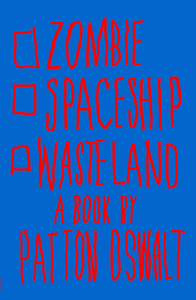
Comedy

Book Review: "Zombie Spaceship Wasteland" by Patton Oswalt
Thanks to ceaseless reruns, it's likely that the majority of this country's population is most familiar with Patton Oswalt via his past sitcom regularity as Spence on The King of Queens. But to only be entertained by Oswalt from that watered-down if marginally tolerable enterprise would be to deprive yourself of some of the past two decades' most cerebrally potent and wildly funny stand-up.
Of course, it's always been Oswalt's main bread and butter, one that first began to pay off when he graduated from moribund comedy clubs to cult status in the so-called alternative comedy scene of the mid 1990s. Officially released live albums, comedy specials and/or DVDs (2004's Feelin' Kinda Patton and its extended cut 222, 2007's Werewolves and Lollipops, and 2009's My Weakness is Strong) have followed, the best representations of his inimitable gift of corralling barrages of marvelously assembled words to turn his real-life observations into glittering comedy gold.
If there's a common attribute to be found in Patton's live performances, it's his knack for dropping obscure references with ease -- and yet still remaining easy-to-follow. There's always a variety to chew on, from time-honored nerdy pursuits (comic books from just about any era, the most oblique of Dungeons & Dragons lore) to serious film connoisseurship (what other funnyman could have a bit centered around a revival screening of John Ford's The Searchers, or even knows the films of director Anthony Mann?).
Some performers risk spreading their talent too thin. With Oswalt, the reverse seems to be true.
After delivering his first lead performance as a mentally imbalanced football aficionado in 2009's (unjustly neglected) Big Fan, Oswalt ratchets up yet another achievement, the one he claims to have set out to accomplish in the first place – even before he began to tell jokes under a spotlight.
Write a book.
With Zombie Spaceship Wasteland, Oswalt combines wistful serio-comic essays with briefer larks that play upon semantics and social niceties. The highlights of the latter include a mini comic with vampires caught up in a mundane argument, a mock poem dedicated to Oswalt's last adolescent-borne D&D avatar, and a pretentious wine list that runs off the rails to increasing heights of inanity and insanity.
But, unquestionably, the pieces from the heart leave the most impact.
In a handful of essays, Oswalt vividly details episodes from his young life before his career really took off. There's the recounting of an unsuccessful run in a small town near Vancouver where a low-level (and, by the sounds of it, low-life) comedy club manager acted as Oswalt's gatekeeper into hell. (Or, at least, a week in monotony with sparsely attended audiences at night and a sad-sack hotel room during daylight hours.)
These confessional essays take on a somber, elegiac tone. There's an ode to a comfortably numb uncle, and the point where sheer adoration for this slightly nutty relative turned into horrendous worry over ever turning up like the electric blanket-huddled mass who literally became an informal direction on the small town's map.
Maybe most effective is the opener, Ticket Booth, where Oswalt considers his time spent as a youngster tearing tickets at a three-screen multiplex, circa summer 1987. He paints an indelible impression of the era (Jaws: The Revenge and Adventures in Babysitting lighting theater screens), his lame-brain drinking friends, and how a petty theft of an even pettier co-worker's few living supplies -- alongside continual listens of R.E.M's Fables of the Reconstructed -- could act as declamatory road signs to change one's path in life.
As he states elsewhere in the book, Oswalt had always hoped to be a man of letters, describing how powerful certain books were in his formative years. The floodgates were open due to two full-time working parents plucking random paperbacks off supermarket shelves, where acts of depravity could gleefully sneak their way into Oswalt's forming sensibilities byway of printed text and where, as he says in so many words, thieves, mutants and monsters could rub shoulders with the protagonists from the young adult fiction he was safely ingesting.
Harlan Ellison (who provides a blurb on the back) and Philip K. Dick loom large, but it's Stephen King that's brought up again and again as a major influence, most evidently in the way Oswalt thought his life-as-an-author would mature. Before moving to California and making a name for himself, Oswalt (perhaps realistically) believed he'd have to mine Virginia and turn it into the equivalent of King's beloved Maine.
Oswalt's taken a decidedly different route to author-hood, but his stuff is even better because of the detour. Despite the title (a comparison of the three subjects aspiring juvenile writers tend to write about), Zombie Spaceship Wasteland is deeply felt material.
Tags: book review, Patton Oswalt, Zombie Spaceship Wasteland, comedy, stand-up
Related Posts
- Review: Myq Kaplan – Rini
- Between Two Screens with Breanne Williamson
- JFL Toronto Review: Conner O'Malley
- Live Review: Tracy Hamilton's "I'm Actually Right About Everything: A Bisexual Love Story"
- Review: Jeremy Dobski - Love Language (2024)
Original Comments Posted (1)
Kristy says...
Thanks for the great review about the book. Now I think, i should gonna to get it and read.

SBM on Social Media